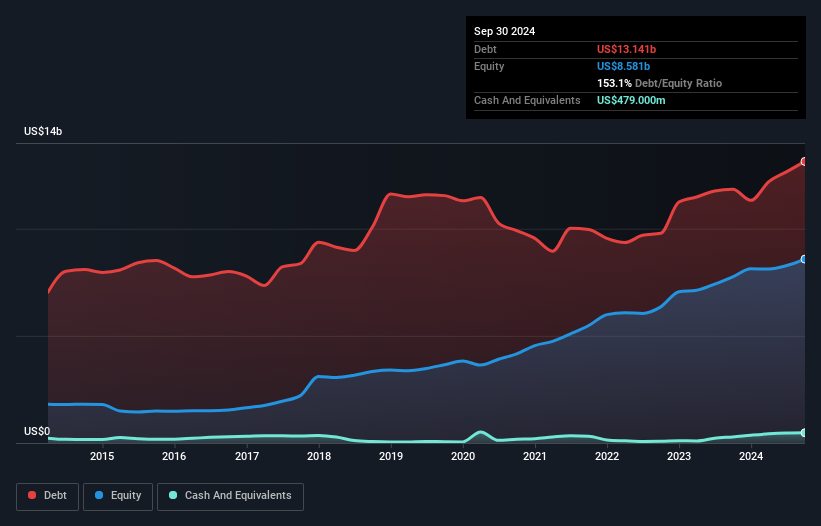- United States
- /
- Trade Distributors
- /
- NYSE:URI
These 4 Measures Indicate That United Rentals (NYSE:URI) Is Using Debt Reasonably Well

Warren Buffett famously said, 'Volatility is far from synonymous with risk.' So it might be obvious that you need to consider debt, when you think about how risky any given stock is, because too much debt can sink a company. As with many other companies United Rentals, Inc. (NYSE:URI) makes use of debt. But the real question is whether this debt is making the company risky.
When Is Debt A Problem?
Debt assists a business until the business has trouble paying it off, either with new capital or with free cash flow. Part and parcel of capitalism is the process of 'creative destruction' where failed businesses are mercilessly liquidated by their bankers. However, a more usual (but still expensive) situation is where a company must dilute shareholders at a cheap share price simply to get debt under control. Of course, debt can be an important tool in businesses, particularly capital heavy businesses. When we think about a company's use of debt, we first look at cash and debt together.
View our latest analysis for United Rentals
What Is United Rentals's Debt?
You can click the graphic below for the historical numbers, but it shows that as of September 2024 United Rentals had US$13.1b of debt, an increase on US$11.8b, over one year. However, it does have US$479.0m in cash offsetting this, leading to net debt of about US$12.7b.

A Look At United Rentals' Liabilities
The latest balance sheet data shows that United Rentals had liabilities of US$4.03b due within a year, and liabilities of US$15.8b falling due after that. Offsetting this, it had US$479.0m in cash and US$2.40b in receivables that were due within 12 months. So it has liabilities totalling US$17.0b more than its cash and near-term receivables, combined.
While this might seem like a lot, it is not so bad since United Rentals has a huge market capitalization of US$50.5b, and so it could probably strengthen its balance sheet by raising capital if it needed to. But it's clear that we should definitely closely examine whether it can manage its debt without dilution.
In order to size up a company's debt relative to its earnings, we calculate its net debt divided by its earnings before interest, tax, depreciation, and amortization (EBITDA) and its earnings before interest and tax (EBIT) divided by its interest expense (its interest cover). The advantage of this approach is that we take into account both the absolute quantum of debt (with net debt to EBITDA) and the actual interest expenses associated with that debt (with its interest cover ratio).
United Rentals has a debt to EBITDA ratio of 2.8 and its EBIT covered its interest expense 6.1 times. Taken together this implies that, while we wouldn't want to see debt levels rise, we think it can handle its current leverage. United Rentals grew its EBIT by 5.4% in the last year. Whilst that hardly knocks our socks off it is a positive when it comes to debt. There's no doubt that we learn most about debt from the balance sheet. But it is future earnings, more than anything, that will determine United Rentals's ability to maintain a healthy balance sheet going forward. So if you're focused on the future you can check out this free report showing analyst profit forecasts.
Finally, a business needs free cash flow to pay off debt; accounting profits just don't cut it. So it's worth checking how much of that EBIT is backed by free cash flow. In the last three years, United Rentals's free cash flow amounted to 48% of its EBIT, less than we'd expect. That weak cash conversion makes it more difficult to handle indebtedness.
Our View
United Rentals's net debt to EBITDA was a real negative on this analysis, as was its level of total liabilities. On the other hand, we found comfort in its relatively strong EBIT growth rate. Looking at all this data makes us feel a little cautious about United Rentals's debt levels. While debt does have its upside in higher potential returns, we think shareholders should definitely consider how debt levels might make the stock more risky. When analysing debt levels, the balance sheet is the obvious place to start. But ultimately, every company can contain risks that exist outside of the balance sheet. For example - United Rentals has 1 warning sign we think you should be aware of.
If, after all that, you're more interested in a fast growing company with a rock-solid balance sheet, then check out our list of net cash growth stocks without delay.
New: AI Stock Screener & Alerts
Our new AI Stock Screener scans the market every day to uncover opportunities.
• Dividend Powerhouses (3%+ Yield)
• Undervalued Small Caps with Insider Buying
• High growth Tech and AI Companies
Or build your own from over 50 metrics.
Have feedback on this article? Concerned about the content? Get in touch with us directly. Alternatively, email editorial-team (at) simplywallst.com.
This article by Simply Wall St is general in nature. We provide commentary based on historical data and analyst forecasts only using an unbiased methodology and our articles are not intended to be financial advice. It does not constitute a recommendation to buy or sell any stock, and does not take account of your objectives, or your financial situation. We aim to bring you long-term focused analysis driven by fundamental data. Note that our analysis may not factor in the latest price-sensitive company announcements or qualitative material. Simply Wall St has no position in any stocks mentioned.
About NYSE:URI
United Rentals
Through its subsidiaries, operates as an equipment rental company.
Fair value with acceptable track record.
Similar Companies
Market Insights
Community Narratives




